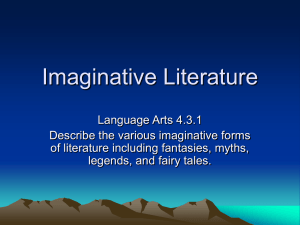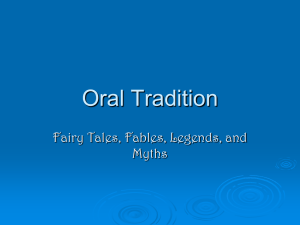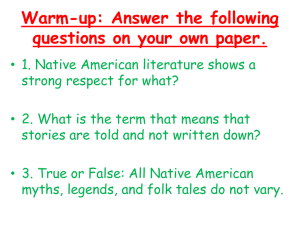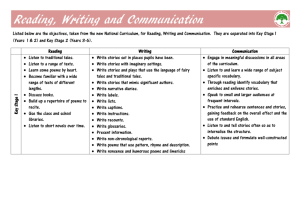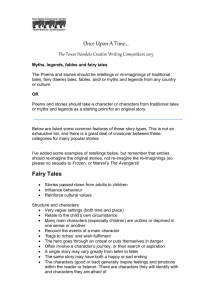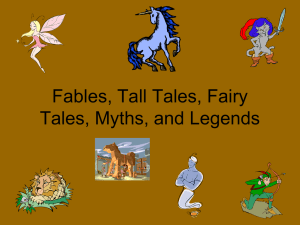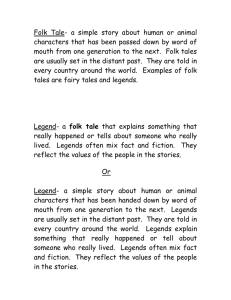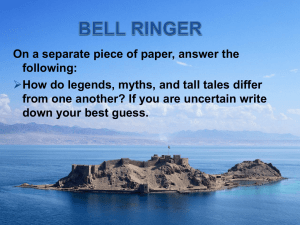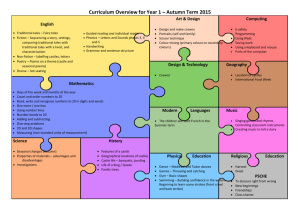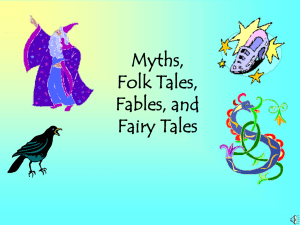YEAR 5 AUTUMN TERM 2015 CURRICULUM BOOKLET
advertisement
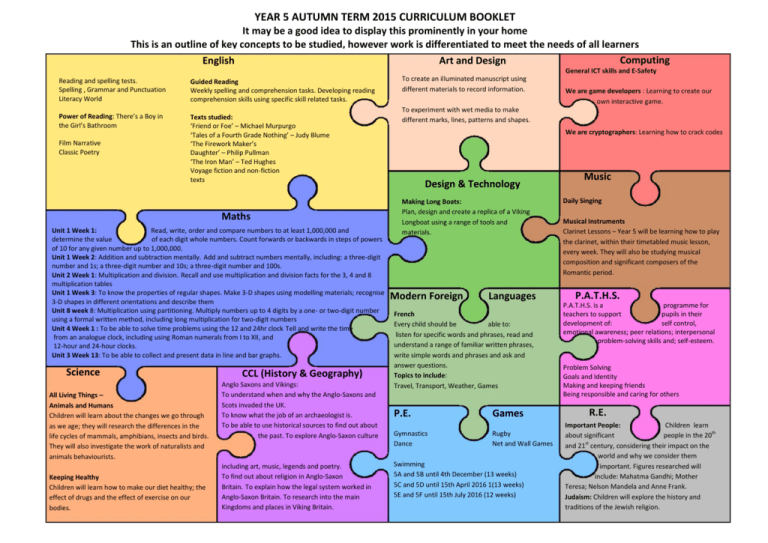
YEAR 5 AUTUMN TERM 2015 CURRICULUM BOOKLET It may be a good idea to display this prominently in your home This is an outline of key concepts to be studied, however work is differentiated to meet the needs of all learners Computing Art and Design English General ICT skills and E-Safety Reading and spelling tests. Spelling , Grammar and Punctuation Literacy World Guided Reading Weekly spelling and comprehension tasks. Developing reading comprehension skills using specific skill related tasks. Power of Reading: There’s a Boy in the Girl’s Bathroom Texts studied: ‘Friend or Foe’ – Michael Murpurgo ‘Tales of a Fourth Grade Nothing’ – Judy Blume ‘The Firework Maker’s Daughter’ – Philip Pullman ‘The Iron Man’ – Ted Hughes Voyage fiction and non-fiction texts Film Narrative Classic Poetry Maths Unit 1 Week 1: Read, write, order and compare numbers to at least 1,000,000 and determine the value of each digit whole numbers. Count forwards or backwards in steps of powers of 10 for any given number up to 1,000,000. Unit 1 Week 2: Addition and subtraction mentally. Add and subtract numbers mentally, including: a three-digit number and 1s; a three-digit number and 10s; a three-digit number and 100s. Unit 2 Week 1: Multiplication and division. Recall and use multiplication and division facts for the 3, 4 and 8 multiplication tables Unit 1 Week 3: To know the properties of regular shapes. Make 3-D shapes using modelling materials; recognise 3-D shapes in different orientations and describe them Unit 8 week 8: Multiplication using partitioning. Multiply numbers up to 4 digits by a one- or two-digit number using a formal written method, including long multiplication for two-digit numbers Unit 4 Week 1 : To be able to solve time problems using the 12 and 24hr clock Tell and write the time from an analogue clock, including using Roman numerals from I to XII, and 12-hour and 24-hour clocks. Unit 3 Week 13: To be able to collect and present data in line and bar graphs. Science All Living Things – Animals and Humans Children will learn about the changes we go through as we age; they will research the differences in the life cycles of mammals, amphibians, insects and birds. They will also investigate the work of naturalists and animals behaviourists. Keeping Healthy Children will learn how to make our diet healthy; the effect of drugs and the effect of exercise on our bodies. CCL (History & Geography) Anglo Saxons and Vikings: To understand when and why the Anglo-Saxons and Scots invaded the UK. To know what the job of an archaeologist is. To be able to use historical sources to find out about the past. To explore Anglo-Saxon culture including art, music, legends and poetry. To find out about religion in Anglo-Saxon Britain. To explain how the legal system worked in Anglo-Saxon Britain. To research into the main Kingdoms and places in Viking Britain. To create an illuminated manuscript using different materials to record information. We are game developers : Learning to create our own interactive game. To experiment with wet media to make different marks, lines, patterns and shapes. We are cryptographers: Learning how to crack codes Design & Technology Making Long Boats: Plan, design and create a replica of a Viking Longboat using a range of tools and materials. Modern Foreign Languages French Every child should be able to: listen for specific words and phrases, read and understand a range of familiar written phrases, write simple words and phrases and ask and answer questions. Topics to include: Travel, Transport, Weather, Games P.E. Gymnastics Dance Games Rugby Net and Wall Games Swimming 5A and 5B until 4th December (13 weeks) 5C and 5D until 15th April 2016 1(13 weeks) 5E and 5F until 15th July 2016 (12 weeks) Music Daily Singing Musical Instruments Clarinet Lessons – Year 5 will be learning how to play the clarinet, within their timetabled music lesson, every week. They will also be studying musical composition and significant composers of the Romantic period. P.A.T.H.S. P.A.T.H.S. is a programme for teachers to support pupils in their development of: self control, emotional awareness; peer relations; interpersonal problem-solving skills and; self-esteem. Problem Solving Goals and Identity Making and keeping friends Being responsible and caring for others R.E. Important People: Children learn about significant people in the 20th and 21st century, considering their impact on the world and why we consider them important. Figures researched will include: Mahatma Gandhi; Mother Teresa; Nelson Mandela and Anne Frank. Judaism: Children will explore the history and traditions of the Jewish religion. HOMEWORK Reading Reading is considered the most important element of your child’s homework and should be undertaken nightly. Your child has received a reading record which should record each night’s reading and needs to be signed by a parent/carer. You may wish to fill in the comment box with a brief remark regarding your child’s reading progress. How you can help . . . Encourage your child to read regularly and to choose from a range of books and authors. Please monitor your child’s reading through their reading record book and listen to them read daily. Parents’ support is also invaluable in helping us hear the children read aloud during the school day. If you feel you can offer your time to help us in this or any other way, it would be very much appreciated. Homework is recorded in homework diaries. Children will have English or Maths homework every Friday related to their small-step targets. In addition, they will have weekly spelling and times tables to learn. Additional homework may be set during the week, such as finishing off work begun at school. Homework is set to support the teaching and learning activities that take place at school. You can support your child’s learning by playing an active role in ensuring that they complete homework tasks to the best of their ability. Talk Homework will be set regularly. It is necessary that parents/guardians support their children through discussions and questioning to gain a better understanding of the homework set Small Step Targets Your child will be set small-step targets for reading, writing and maths each half-term. Children will work on these targets at home and at school. We would ask parents/carers to be aware of their child’s targets and to help them work towards achieving these at home. School Outings Parental Support is invaluable in enabling us to organise trips. If you are able to help at any time, this would be appreciated. MyMaths MyMaths website is an essential tool to help your child revise topics we have studied through the term. Each child has their own login and password and can access not only homework tasks, but topic ‘lessons’ that reflect the methods they have been taught at school. The website is www.mymaths.co.uk Equipment Pencil case, handwriting pen or ink pen, pencils, coloured pencils, highlighters, ruler and rubber. Children are not permitted to use Tippex. P.E. Kit Black shorts/joggers, red t-shirt, trainers/plimsolls, bobble for long hair. No jewellery and please ensure that religious symbols or studs worn on PE days are covered. Swimming Kit (swimming hats can be bought from school office for £2) Bug Club Pupils can use Bug Club at home to read books which have been set for them to further their reading skills. With each book that your child reads, there are questions that need to be answered. Answer these questions accurately and they will be able to build their own bug! Pupils have their own login and password and the website is www.bugclub.co.uk Home/School Communication Parentmail This is a quick and efficient way of receiving notices from the school via text message. Please ensure you provide the school with an up to date mobile telephone number and notify us of any changes to your number immediately. USEFUL WEBSITES MATHS www.mathszone.co.uk http://www.woodlands-junior.kent.sch.uk/ http://www.bbc.co.uk/schools/ks2bitesize/ http://www.crickweb.co.uk/ks2numeracy.html http://www.mad4maths.com/ http://www.nrich.maths.org/public/ http://www.mathsisfun.com/ DATES FOR YOUR DIARY 11 th th and 12 November – Parents’ Evening At this meeting you will have the opportunity to discuss your child’s progress and levels of attainment, small-steps targets, Individual Education Plans, EAL and Special Needs provisions where appropriate. 16th – 20th November – Anti - Bullying week 30th – 4th November – Assessment Week LITERACY http://www.woodlands-junior.kent.sch.uk/ http://www.bbc.co.uk/schools/ks2bitesize/ http://www.schooljotter.com/showpage.php?id=5 0219 http://www.crickweb.co.uk/ks2literacy.html http://www.lola.landscoreprimary.devon.sch.uk/page13.html SCIENCE http://www.bbc.co.uk/schools/ks2bitesize/science/ http://www.woodlandsjunior.kent.sch.uk/revision/Science/ http://www.sciencenewsforkids.org/ http://www.sciencekis.co.nz/ 17th December – Upper School Christmas Disco Year 5 Assembly Dates 2nd November – 5B Assembly 9th November – 5D Assembly 23RD November – 5E Assembly 7th December – 5A Assembly 22nd February – 5F Assembly 7TH March – 5C Assembly HOME/SCHOOL COMMUNICATION If you wish to speak to your child’s teacher at any time, you may find the following arrangements helpful. You may find it appropriate to inform us by letter. If you are intending to convey a brief message you can inform is in the morning before school (8.40 am approx). If you wish to have a meeting with your child’s teacher to address a particular concern, please request an appointment. Homework diaries are intended to act as an important link of communication between home and school and should be checked daily. Please continue to use the diary to write a brief message to your child’s teacher and to check for any messages sent from school. Diaries should be signed weekly by class teachers and parents/carers, to acknowledge that they have been checked and homework completed. BEHAVIOUR Our school Vision embraces the concepts of enjoy, learn, achieve. To ensure children are working towards fulfilling their potential, it is imperative that we insist on the highest levels of behaviour at all times. Children need to respect and appreciate themselves and each other, all adults working in the school and the whole-school environment. Unacceptable behaviour will not be tolerated and will carry consequences. Positive behaviour is acknowledged and rewarded in a variety of ways If you have any further questions or queries, please do not hesitate to speak to you child’s class teacher. ENJOY, LEARN, ACHIEVE! READING LIST READING LIST Traditional stores, myths, legends, fables from a range of cultures Traditional stores, myths, legends, fables from a range of cultures (continued) Andersen, H Khanduri, R Lawrence, A Lock, K Master, A Mayo, M Any tales from Hans Christian Anderson Anholt, L Little Red Riding Wolf Ardagh, P Ancient Greek Myths & Legends (292) Barlow Mad Myths: A Touch of Wind! Brooks, F Jason and the Argonauts Clayton, P Stories from the Seven Seas (398.2) Coleman, M Top Ten Fairy Stories Crossley-Holland, K Beowolf Dalton, A Starlight Princess and other Princess Stories Deary, T Top Ten Greek Legends Fraser, A Robin Hood French, V Aesop’s Funky Fables Gavin, J Our favourite Stories (398.2) Monkey in the Stars Three Indian Goddesses Three Indian Princesses Gibbons, A Warriors of Raven Gobel, P The Girl Who Loved Wild Horses Brothers Grimm Any of their traditional tales Horowitz, A Myths and Legends (398.2) Hughes, T Dreamfighter & Other Creation Tales How the Whale Became Hull, R Stores from West Africa (398.2) Irving, W Legend of Sleepy Hollow and Other Tales Jennings, L Stories from Around the World McCaughrean, G Miles, B Mitchell, A Morpurgo, M Naidu, V Nye, R Perrault, C Philip, N Philip, N Pirotta, S Reeves, J Rosen, M Sherlock, P Steptoe, J Just So Stories Tales from Perrault Xochiquetzal (398.2) Roman Myths & Legends (292) Fiery Phoenix and the Lemon Princess Magical Mermaid and Kate Crackernuts Daedalus and Icarus (292) Wooden Horse and Pandora’s Box (292) One Thousand and One Arabian Nights Robin Hood: His Life and Legend (398.2) Adventures of Robin Hood & Marian Arthur, High King of Britain The Sleeping Sword Robin of Sherwood Stores from India (398.2) Beowulf Perrault’s Complete Fairy Tales Illustrated Book of Myths (398.2) Robin Hood Stores from China (398.2) Stores from the Amazon (398.2) Fairy Tales from England South and North, East and West West Indian Folk Tales Mufaro’s Beautiful READING LIST Traditional stores, myths, legends, fables from a range of cultures (continued) Swindells, R Waters, R White, T H Wilson, B Yeoman, J Orchard Book of Stories from Ancient Egypt (398.2) Kingfisher Treasury of Princess Stories Sword in the Stone Fairy Tales from Scotland Seven Voyages of Sinbad the Sailor Poetry – Longer classic poems, including narrative poetry Browning, R Corbett, P Harrison, M Hughes, T Longfellow, H Moses, B Moses, B Noyes, A Rosen, M Stevenson, RL Tennyson, A West, C Wright, K Pied Piper of Hamlin Ramshackle Rainbow Oxford Book of Story Poems Oxford Treasury of Classic Poems Nessie the Mannerless Monster Hiawatha Classic Poems Books 2 & 3 Are You Sitting Comfortably? The Highwayman Classic Poetry A Child’s Garden of Verses The Lady of Shallot Long Tales, Short Tales and Tall Tales Poems for over 10 year olds ENJOY, LEARN, ACHIEVE!
